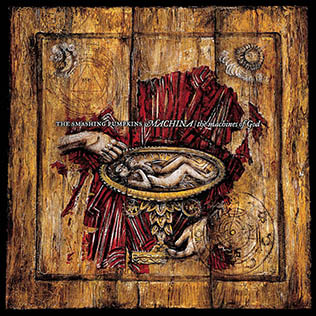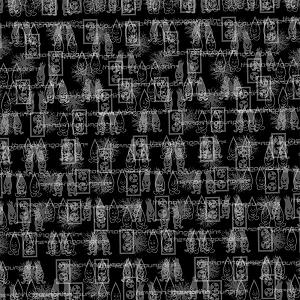The Machina Albums
Exploring the musical components of The Smashing Pumpkins' rock opera
The Two-Part Rock Opera
The Machina project consists of two albums that together tell the story of Glass and the Machines of God: "Machina/The Machines of God" and "Machina II/The Friends & Enemies of Modern Music."
Originally conceived as a single double album, label issues and the band's impending breakup led to the material being split, with the first album receiving a traditional release and the second being distributed as a limited vinyl pressing and free internet download.
Despite the unconventional release strategy, the two albums form a cohesive whole, with complementary themes, sounds, and narrative elements that together complete the Machina rock opera.
A Note on Machina II
Machina II/The Friends & Enemies of Modern Music was released in an unconventional manner. Only 25 vinyl copies were initially produced, given to friends of the band and fans who ran prominent Smashing Pumpkins websites, with instructions to distribute the music online for free.
This innovative distribution method was revolutionary for its time, predating many modern digital release strategies by major artists.
Machina/The Machines of God

The first part of the Machina rock opera, this album introduces the story of Glass and his spiritual transformation. Musically, it represents a departure from the band's previous work, incorporating elements of gothic rock, electronic music, and heavy metal with a more polished production style.
The album was released during a tumultuous period for the band, following the departure of bassist D'arcy Wretzky and preceding the band's first breakup later that year.
Featured Tracks
The Everlasting Gaze
The lead single from Machina, this track introduces Glass's new perspective after his spiritual awakening. The heavy, distorted guitars and electronic elements establish the album's sonic palette.
Stand Inside Your Love
The second single from the album, this romantic track explores Glass's relationship with June. Its sweeping melody and emotional lyrics make it one of the album's most accessible moments.
Try, Try, Try
The third single from Machina, this track depicts the challenges of Glass's journey. Its more melodic approach contrasts with the album's heavier moments while maintaining the thematic continuity.
Glass and the Ghost Children
The epic centerpiece of the album, this nearly 10-minute track directly references the protagonist and his followers. Its complex structure and shifting dynamics make it a key piece of the Machina narrative.
Complete Track Listing
- "The Everlasting Gaze" – 4:00
- "Raindrops + Sunshowers" – 4:39
- "Stand Inside Your Love" – 4:14
- "I of the Mourning" – 4:37
- "The Sacred and Profane" – 4:22
- "Try, Try, Try" – 5:09
- "Heavy Metal Machine" – 5:52
- "This Time" – 4:43
- "The Imploding Voice" – 4:24
- "Glass and the Ghost Children" – 9:56
- "Wound" – 3:58
- "The Crying Tree of Mercury" – 3:43
- "With Every Light" – 3:56
- "Blue Skies Bring Tears" – 5:45
- "Age of Innocence" – 3:55
Singles
- "The Everlasting Gaze" (December 1999)
- "Stand Inside Your Love" (January 2000)
- "Try, Try, Try" (October 2000)
Narrative Context
Within the Machina narrative, this album represents the beginning of Glass's journey after hearing the voice of God through radio transmissions. Songs like "The Everlasting Gaze" and "I of the Mourning" address his spiritual awakening, while "Glass and the Ghost Children" directly references the protagonist and his devoted followers.
"Stand Inside Your Love" explores Glass's relationship with June, while later tracks like "Wound" and "The Crying Tree of Mercury" hint at the tragedy to come.
The album's sound—dense, layered, and often mechanical—reflects the themes of technology and spirituality that run throughout the narrative. The production creates a sense of both grandeur and alienation that mirrors Glass's experience as a transformed rock star trying to communicate a divine message.
The album concludes with "Age of Innocence," which can be interpreted as Glass reflecting on his journey and the loss of his former self.
Machina II/The Friends & Enemies of Modern Music

The second part of the Machina rock opera, this album continues and concludes the story of Glass. Released independently after the band's relationship with Virgin Records deteriorated, Machina II consists of a full-length LP and three EPs containing 25 tracks in total.
The album features a rawer, more immediate sound than its predecessor, with elements of post-punk, hard rock, and experimental music. Many fans consider some of the material on Machina II to be among the band's strongest work from this era.
Featured Tracks
Glass' Theme
This instrumental track directly references the protagonist of the Machina narrative, setting the tone for the second part of the rock opera with its atmospheric and somewhat ominous sound.
Real Love
One of the standout tracks from Machina II, "Real Love" explores themes of authentic connection in a world of artifice. Its powerful melody and emotional delivery make it a fan favorite.
Home
This track explores themes of belonging and the search for meaning. Within the narrative, it can be interpreted as Glass's longing for connection after June's loss.
Let Me Give the World to You
Originally recorded during the Adore sessions but reworked for Machina II, this melodic track represents Glass's desire to share his spiritual message with the world.
Track Listing (LP)
- "Glass' Theme" – 1:54
- "Cash Car Star" – 3:41
- "Dross" – 3:26
- "Real Love" – 4:16
- "Go" – 3:47
- "Let Me Give the World to You" – 4:10
- "Innosense" – 2:33
- "Home" – 4:29
- "Blue Skies Bring Tears" (Version Electrique) – 3:18
- "White Spyder" – 3:37
- "In My Body" – 6:50
- "If There Is a God" (Full Band Version) – 2:08
- "Le Deux Machina" – 1:54
- "Atom Bomb" – 3:51
EP Tracks
In addition to the LP, Machina II included three EPs with additional tracks and alternative versions, including "Lucky 13," "Speed Kills," "Slow Dawn," "Vanity," and "Heavy Metal Machine" (Alternate Version).
Narrative Context
Within the Machina narrative, this album represents the later part of Glass's journey, particularly after the loss of June. Songs like "Glass' Theme" directly reference the protagonist, while "Real Love" and "Home" explore themes of loss, longing, and the search for meaning.
"Let Me Give the World to You" can be interpreted as Glass's desire to share his spiritual message, while "If There Is a God" reflects his questioning and struggle after June's death.
The rawer sound of Machina II mirrors Glass's emotional state—more immediate, less polished, and at times more desperate than on the first album. The electronic elements remain, representing the continued theme of technology as both medium and barrier for spiritual communication.
The album concludes the Machina narrative with a sense of both resolution and ambiguity, reflecting the open-ended nature of spiritual journeys and artistic expression.
Musical Themes and Production
Sound and Production
The Machina albums feature a distinctive sound characterized by:
- Dense, layered guitar work with heavy processing
- Electronic elements and programming
- Gothic and industrial influences
- Dramatic dynamic shifts
- Atmospheric production with significant reverb and spatial effects
Producer Flood (who had previously worked with the band on Mellon Collie and the Infinite Sadness) helped create the album's distinctive sound, which Billy Corgan described as "a rock opera set in a gothic-cyber-metal world."
Lyrical Themes
The lyrics across both Machina albums explore:
- Spiritual awakening and divine communication
- The relationship between technology and humanity
- Love, loss, and transcendence
- Media, fame, and authentic identity
- Transformation and rebirth
Billy Corgan's lyrics on these albums are often symbolic and multi-layered, using metaphor and allegory to tell the story of Glass while also addressing broader philosophical and spiritual themes.
Legacy and Reissue Plans
The Machina Reissue: 25th Anniversary Box Set
A comprehensive Machina reissue is scheduled for release on August 22, 2025, coinciding with the 25th anniversary of the albums. This deluxe box set will combine both Machina I and Machina II albums as originally intended, along with additional unreleased material from the sessions.
The reissue will include 48 tracks of Machina material plus 32 additional demos, outtakes, and live cuts, totaling 80 songs. Pre-orders are expected to begin on June 27, 2025.
This release will finally present the Machina project in its complete form, allowing listeners to experience the rock opera as it was originally conceived.
Critical Reception
Upon its release, Machina/The Machines of God received mixed reviews from critics, with some praising its ambition and others finding it overproduced or difficult to access. Commercially, it underperformed compared to previous Smashing Pumpkins albums.
Machina II, due to its unconventional release, was not widely reviewed by mainstream publications but has been embraced by many fans who consider it to contain some of the band's strongest material from this era.
Cultural Impact
The Machina albums represent an important chapter in The Smashing Pumpkins' history, marking both the end of the band's original run and a bold artistic statement that pushed the boundaries of what a rock album could be.
The innovative release strategy for Machina II was ahead of its time, predating similar approaches by major artists by several years and anticipating the digital distribution models that would later become common.
From the Creator
"Machina was written as a kind of an electronic opera. It was supposed to be a musical, theatrical production with characters and dialogue."
"I think Machina is some of the best work I've ever done, but it's not an easy album to get into."
"The story is basically about a rock star who's torn down by his success and audience and is trying to rebuild his life and find God and find new reasons to make music."